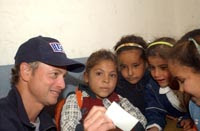 Actor Gary Sinise (Forrest Gump, Apollo 13, CSI:NY) was shooting a film in North Carolina one year when his wife and two children came to visit him on the set. The day they arrived, shooting was cancelled and everyone was told to evacuate the town because a dangerous hurricane was coming.
Actor Gary Sinise (Forrest Gump, Apollo 13, CSI:NY) was shooting a film in North Carolina one year when his wife and two children came to visit him on the set. The day they arrived, shooting was cancelled and everyone was told to evacuate the town because a dangerous hurricane was coming.Thinking the airports would be packed, Sinise and his family rented a car and raced toward Charlotte. Driving down the freeway chased by gale force winds, torrential rains, and alarming lightning strikes, Sinise's wife Moira turned to him and, out-of-the-blue, said, "I'm going to go back to the Catholic Church."
On the radio show "Personally Speaking with Monsignor Jim Lisante," Sinise recalled that his reaction to his wife's statement was, "WHAT??!!"
Moira's mother had left the Catholic faith when she was young so Moira wasn't raised with any faith tradition. As a result, Sinise, Moira and their kids weren't part of any religion. But Moira was suddenly insistent on this new element in their lives. She continued, "When we get home, I’m going to go to the Catholic Church and our kids are going to go to Catholic school.” Sinise said, "I just looked at her."
The actor's only knowledge of Catholic school came from two friends who used to tell him horror stories. "Plus," he said, "these two friends of mine are just guilt-ridden all the time! So I was like 'No, no, are you crazy?'"
When they eventually got home, Moira went right to a local Catholic church and entered the RCIA program which prepares non-Catholics to receive the sacraments of baptism, communion and confirmation. After two years, Moira formally entered the church. It was an important and meaningful moment for the whole family.
Their kids also started attending Catholic school. Sinise admits, “It was totally opposite from what I had thought…I became a huge supporter of the school and started attending church with my wife and kids. It became the best thing for our family...We were kind of scattered and stuff, and it’s really brought a lot of focus into our lives.”

One recipient of that focus since 2003 is a program Gary Sinise co-founded called "Operation Iraqi Children." A longtime advocate for veterans and a volunteer for the U.S.O., Sinise traveled to the war zone and visited an Iraqi school that had been rebuilt by U.S. troops. Hoping to make a positive difference, he later sent over school supplies that U.S. soldiers distributed to the kids. This boosted the morale of the troops who felt they were doing something useful, and also improved relationships with the Iraqi kids and parents they were helping.

Sinise decided to grow the program so that others could help too. Along with "Seabiscuit" author Laura Hillenbrand, he co-founded "Operation Iraqi Children." People can make monetary donations to be used for school supplies. They can also make care packages themselves. Sinise said, "Church groups, schools and businesses all around the country have done this. We've received thousands and thousands of supplies."
Despite a busy acting career, Sinise remains committed to helping others and has faith that things can change for the better. Maybe that faith is partially thanks to a North Carolina hurricane that changed his family's life.
TonyRossiBlogger@gmail.com






